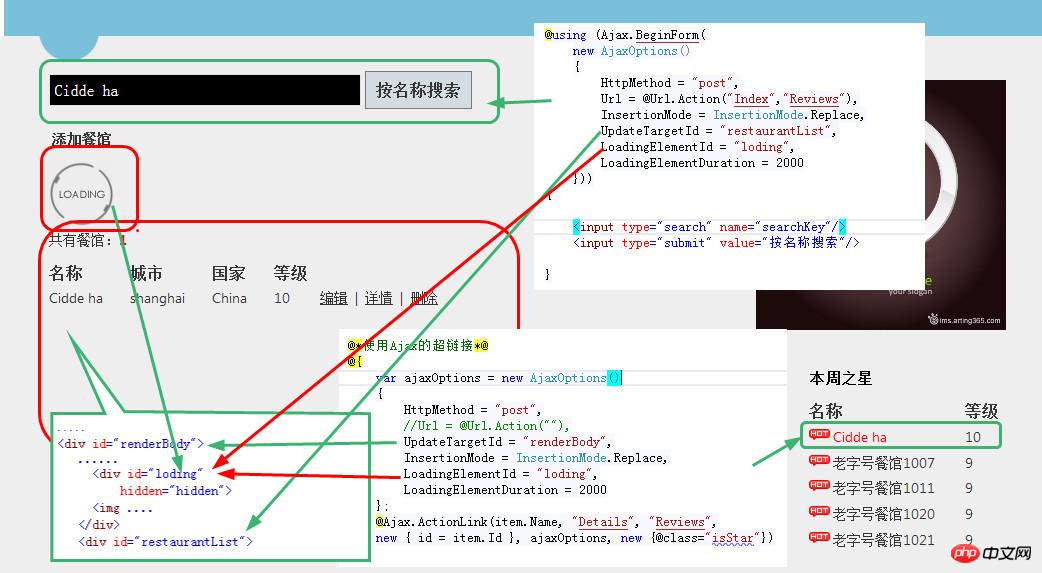浅析Asp.net MVC 中Ajax的使用
在ASP.NET MVC beta中我们可以使用Ajax.BeginForm, Ajax.ActionLink来进行Ajax调用,同样我们也可以使用一些支持Ajax 框架如jQuery来简化对ajax的调用。
一、使用System.Web.Mvc.Ajax
1.1 System.Web.Mvc.Ajax.BeginForm
1.2 System.Web.Mvc.Ajax.ActionLink
二、手工打造自己的“非介入式”Javascript”
一、使用System.Web.Mvc.Ajax

1.1 System.Web.Mvc.Ajax.BeginForm
第一步:用Ajax.BeginForm创建Form
@using (Ajax.BeginForm(
new AjaxOptions()
{
HttpMethod = "post",
Url = @Url.Action("Index","Reviews"),
InsertionMode = InsertionMode.Replace,
UpdateTargetId = "restaurantList",
LoadingElementId = "loding",
LoadingElementDuration = 2000
}))
{
<input type="search" name="searchItem"/>
<input type="submit" value="按名称搜索"/>
}最终生成的form如下:
<form id="form0" method="post"
data-ajax-url="/Reviews"
data-ajax-update="#restaurantList"
data-ajax-mode="replace"
data-ajax-method="post"
data-ajax-loading-duration="2000"
data-ajax-loading="#loding"
data-ajax="true"
action="/Reviews" novalidate="novalidate">第二步:创建Ajax.BeginForm的new AjaxOptions()对象的Url指向的Action
new AjaxOptions()
{
...
Url = @Url.Action("Index","Reviews")
...
}
public ActionResult Index(string searchKey = null)
{
var model = _restaurantReviews.Where(r => searchKey == null || r.Name.ToLower().Contains(searchKey.ToLower().Trim()))
.OrderByDescending(r => r.Rating)
.Take(100)
.Select(r=>new RestaurantReview()
{
City = r.City,
Country = r.Country,
Id = r.Id,
Name = r.Name,
Rating = r.Rating
}).ToList();
if (Request.IsAjaxRequest())
{
System.Threading.Thread.Sleep(1000 * 3);//模拟处理数据需要的时间
//return View(model)会返回整个页面,所以返回部分视图。
return PartialView("_RestaurantPatialView", model);
}
return View(model);
}注意:
关于使用System.Web.Mvc.Ajax的说明:
Controller的Action方法:
(1)当显式添加[HttpPost],传给System.Web.Mvc.Ajax的AjaxOptions()的HttpMethod只能为 "post",
(2)当显式添加[HttpGet],传给System.Web.Mvc.Ajax的AjaxOptions()的HttpMethod只能为 "get",
(3)当都没有显式添加[HttpPost]和[HttpGet],传给System.Web.Mvc.Ajax的AjaxOptions()的HttpMethod可以为 "get"也可以为"post",
第三步:添加要承载更新页面的html元素,
也就是添加添加AjaxOptionsd对象的UpdateTargetId 参数指定的Id为restaurantList的html元素:
这里在页面中添加:id为restaurantList的
:
<p id="restaurantList">... </p>
第四步:(可选)为增强用户体验,添加AjaxOption对象的LoadingElementId参数指定的Id为loding的html元素:
new AjaxOptions()
{
....
LoadingElementId = "loding",
LoadingElementDuration = 2000
}))这里在页面中添加:id为loding的元素,添加了包含一个动态的刷新图片
:

cshtml文件中添加:
<p id="loding" hidden="hidden">
<img class="smallLoadingImg" src="@Url.Content("~/Content/images/loading.gif")" />
</p>1.2 System.Web.Mvc.Ajax.ActionLink
System.Web.Mvc.Ajax.ActionLink与System.Web.Mvc.Ajax.BeginForm用法基本一致
第一步:使用System.Web.Mvc.Ajax.ActionLink创建超链接
@*@Html.ActionLink(item.Name, "Details", "Reviews",new{id = item.Id},new {@class ="isStar"})*@
@*<a class="isStar" href="@Url.Action("Details","Reviews", new {id = item.Id})">@item.Name</a>*@
@*使用Ajax的超链接*@
@{
var ajaxOptions = new AjaxOptions()
{
HttpMethod = "post",
//Url = @Url.Action(""),
UpdateTargetId = "renderBody",
InsertionMode = InsertionMode.Replace,
LoadingElementId = "loding",
LoadingElementDuration = 2000
};
@Ajax.ActionLink(item.Name, "Details", "Reviews", new { id = item.Id }, ajaxOptions, new {@class="isStar"})
}对应生成的最终html为:
<a class="isStar" href="/Reviews/Details/1" data-ajax-update="#renderBody" data-ajax-mode="replace" data-ajax-method="post" data-ajax-loading-duration="2000" data-ajax-loading="#loding" data-ajax="true">
第二步:定义出来响应超链接的Action:
/// <summary>
///关于使用System.Web.Mvc.Ajax的说明:
/// Controller的Action方法:
/// (1)当显式添加[HttpPost],传给System.Web.Mvc.Ajax的AjaxOptions()的HttpMethod只能为 "post",
/// (2)当显式添加[HttpGet],传给System.Web.Mvc.Ajax的AjaxOptions()的HttpMethod只能为 "get",
/// (3) 当都没有显式添加[HttpPost]和[HttpGet],传给System.Web.Mvc.Ajax的AjaxOptions()的HttpMethod可以为 "get"也可以为"post",
/// </summary>
/// <param name="id"></param>
/// <returns></returns>
public ActionResult Details(int id=1)
{
var model = (from r in _restaurantReviews
where r.Id == id
select r).FirstOrDefault();
if (Request.IsAjaxRequest())
{
return PartialView("_RestaurantDetails", model);
}
return View(model);
}第三步:定义承载更新部分的html元素:
<p id="renderBody">
....
</p>第四步:(可选)为增强用户体验,添加AjaxOptionsd对象的LoadingElementId参数指定的Id为loding的html元素:
与1.1第四步相同。
二、手工打造自己的“非介入式”Javascript”
第一步:添加表单:
@* ---------------------------------------------------------
需要手工为Form添加些属性标签,用于锚点
模仿MVC框架的构建自己的“非介入式Javascript”模式
-------------------------------------------------------*@
<form method="post"
action="@Url.Action("Index")"
data-otf-ajax="true"
data-otf-ajax-updatetarget="#restaurantList">
<input type="search" name="searchItem" />
<input type="submit" value="按名称搜索" />
</form>生成的form为:
<form data-otf-ajax-updatetarget="#restaurantList"
data-otf-ajax="true"
action="/Reviews"
method="post"
novalidate="novalidate">第二步:添加处理表单的Action:
这里与1.1的第二步一样。
第三步:添加Js处理表单:
$(function () {
var ajaxFormSubmit = function() {
var $form = $(this);
var ajaxOption = {
type: $form.attr("method"),
url: $form.attr("action"),
data: $form.serialize()
};
$.ajax(ajaxOption).done(function(data) {
var updateTarget = $form.attr("data-otf-ajax-updatetarget");
var $updateTarget = $(updateTarget);
if ($updateTarget.length > 0) {
var $returnHtml = $(data);
$updateTarget.empty().append(data);
$returnHtml.effect("highlight");
}
});
return false;
};
$("form[data-otf-ajax='true']").submit(ajaxFormSubmit);
});上面是我整理给大家的,希望今后会对大家有帮助。
相关文章:
以上是浅析Asp.net MVC 中Ajax的使用的详细内容。更多信息请关注PHP中文网其他相关文章!

热AI工具

Undresser.AI Undress
人工智能驱动的应用程序,用于创建逼真的裸体照片

AI Clothes Remover
用于从照片中去除衣服的在线人工智能工具。

Undress AI Tool
免费脱衣服图片

Clothoff.io
AI脱衣机

Video Face Swap
使用我们完全免费的人工智能换脸工具轻松在任何视频中换脸!

热门文章

热工具

记事本++7.3.1
好用且免费的代码编辑器

SublimeText3汉化版
中文版,非常好用

禅工作室 13.0.1
功能强大的PHP集成开发环境

Dreamweaver CS6
视觉化网页开发工具

SublimeText3 Mac版
神级代码编辑软件(SublimeText3)

热门话题
 crystaldiskmark是什么软件?-crystaldiskmark如何使用?
Mar 18, 2024 pm 02:58 PM
crystaldiskmark是什么软件?-crystaldiskmark如何使用?
Mar 18, 2024 pm 02:58 PM
CrystalDiskMark是一款适用于硬盘的小型HDD基准测试工具,可以快速测量顺序和随机读/写速度。接下来就让小编为大家介绍一下CrystalDiskMark,以及crystaldiskmark如何使用吧~一、CrystalDiskMark介绍CrystalDiskMark是一款广泛使用的磁盘性能测试工具,用于评估机械硬盘和固态硬盘(SSD)的读写速度和随机I/O性能。它是一款免费的Windows应用程序,并提供用户友好的界面和各种测试模式来评估硬盘驱动器性能的不同方面,并被广泛用于硬件评
 foobar2000怎么下载?-foobar2000怎么使用
Mar 18, 2024 am 10:58 AM
foobar2000怎么下载?-foobar2000怎么使用
Mar 18, 2024 am 10:58 AM
foobar2000是一款能随时收听音乐资源的软件,各种音乐无损音质带给你,增强版本的音乐播放器,让你得到更全更舒适的音乐体验,它的设计理念是将电脑端的高级音频播放器移植到手机上,提供更加便捷高效的音乐播放体验,界面设计简洁明了易于使用它采用了极简的设计风格,没有过多的装饰和繁琐的操作能够快速上手,同时还支持多种皮肤和主题,根据自己的喜好进行个性化设置,打造专属的音乐播放器支持多种音频格式的播放,它还支持音频增益功能根据自己的听力情况调整音量大小,避免过大的音量对听力造成损害。接下来就让小编为大
 网易邮箱大师怎么用
Mar 27, 2024 pm 05:32 PM
网易邮箱大师怎么用
Mar 27, 2024 pm 05:32 PM
网易邮箱,作为中国网民广泛使用的一种电子邮箱,一直以来以其稳定、高效的服务赢得了用户的信赖。而网易邮箱大师,则是专为手机用户打造的邮箱软件,它极大地简化了邮件的收发流程,让我们的邮件处理变得更加便捷。那么网易邮箱大师该如何使用,具体又有哪些功能呢,下文中本站小编将为大家带来详细的内容介绍,希望能帮助到大家!首先,您可以在手机应用商店搜索并下载网易邮箱大师应用。在应用宝或百度手机助手中搜索“网易邮箱大师”,然后按照提示进行安装即可。下载安装完成后,我们打开网易邮箱账号并进行登录,登录界面如下图所示
 百度网盘app怎么用
Mar 27, 2024 pm 06:46 PM
百度网盘app怎么用
Mar 27, 2024 pm 06:46 PM
在如今云存储已经成为我们日常生活和工作中不可或缺的一部分。百度网盘作为国内领先的云存储服务之一,凭借其强大的存储功能、高效的传输速度以及便捷的操作体验,赢得了广大用户的青睐。而且无论你是想要备份重要文件、分享资料,还是在线观看视频、听取音乐,百度网盘都能满足你的需求。但是很多用户们可能对百度网盘app的具体使用方法还不了解,那么这篇教程就将为大家详细介绍百度网盘app如何使用,还有疑惑的用户们就快来跟着本文详细了解一下吧!百度云网盘怎么用:一、安装首先,下载并安装百度云软件时,请选择自定义安装选
 BTCC教学:如何在BTCC交易所绑定使用MetaMask钱包?
Apr 26, 2024 am 09:40 AM
BTCC教学:如何在BTCC交易所绑定使用MetaMask钱包?
Apr 26, 2024 am 09:40 AM
MetaMask(中文也叫小狐狸钱包)是一款免费的、广受好评的加密钱包软件。目前,BTCC已支持绑定MetaMask钱包,绑定后可使用MetaMask钱包进行快速登入,储值、买币等,且首次绑定还可获得20USDT体验金。在BTCCMetaMask钱包教学中,我们将详细介绍如何注册和使用MetaMask,以及如何在BTCC绑定并使用小狐狸钱包。MetaMask钱包是什么?MetaMask小狐狸钱包拥有超过3,000万用户,是当今最受欢迎的加密货币钱包之一。它可免费使用,可作为扩充功能安装在网络
 小爱音箱怎么使用 小爱音箱怎么连接手机
Feb 22, 2024 pm 05:19 PM
小爱音箱怎么使用 小爱音箱怎么连接手机
Feb 22, 2024 pm 05:19 PM
长按音箱的播放键后,在软件中连接wifi即可使用。教程适用型号:小米12系统:EMUI11.0版本:小爱同学2.4.21解析1首先找到音箱的播放键,长按进入配网模式。2在手机上的小爱音箱软件中登录小米账号,点击添加新的小爱音箱。3输入wifi的名称和密码后,即可呼唤小爱同学进行使用了。补充:小爱音箱有什么功能1小爱音箱有系统功能、社交功能、娱乐功能、知识功能、生活功能、智能家庭、训练计划。总结/注意事项手机要提前安装好小爱同学APP,方便连接和使用。
 教你使用 iOS 17.4「失窃设备保护」新进阶功能
Mar 10, 2024 pm 04:34 PM
教你使用 iOS 17.4「失窃设备保护」新进阶功能
Mar 10, 2024 pm 04:34 PM
Apple在周二推出了iOS17.4更新,为iPhone带来了一系列新功能和修复。这次更新包括了全新的表情符号,同时欧盟用户也能够下载其他应用商店。此外,更新还加强了对iPhone安全性的控制,引入了更多的「失窃设备保护」设置选项,为用户提供更多选择和保障。"iOS17.3首次引入了“失窃设备保护”功能,为用户的敏感资料增加了额外的安全保障。当用户不在家等熟悉地点时,该功能要求用户首次输入生物特征信息,并在一小时后再次输入信息才能访问和更改某些数据,如修改AppleID密码或关闭失窃设备保护功能
 如何使用迅雷下载磁力链接
Feb 25, 2024 pm 12:51 PM
如何使用迅雷下载磁力链接
Feb 25, 2024 pm 12:51 PM
随着网络技术的迅猛发展,我们的生活也得到了极大的便利,其中之一就是能够通过网络下载和分享各种资源。而在下载资源的过程中,磁力链接成为了一种非常常见和方便的下载方式。那么,迅雷磁力链接又是如何使用的呢?下面,我将给大家详细介绍一下。迅雷是一款非常流行的下载工具,它支持多种下载方式,其中包括磁力链接。磁力链接可以理解为一种下载地址,通过它我们可以获取到资源的相关






